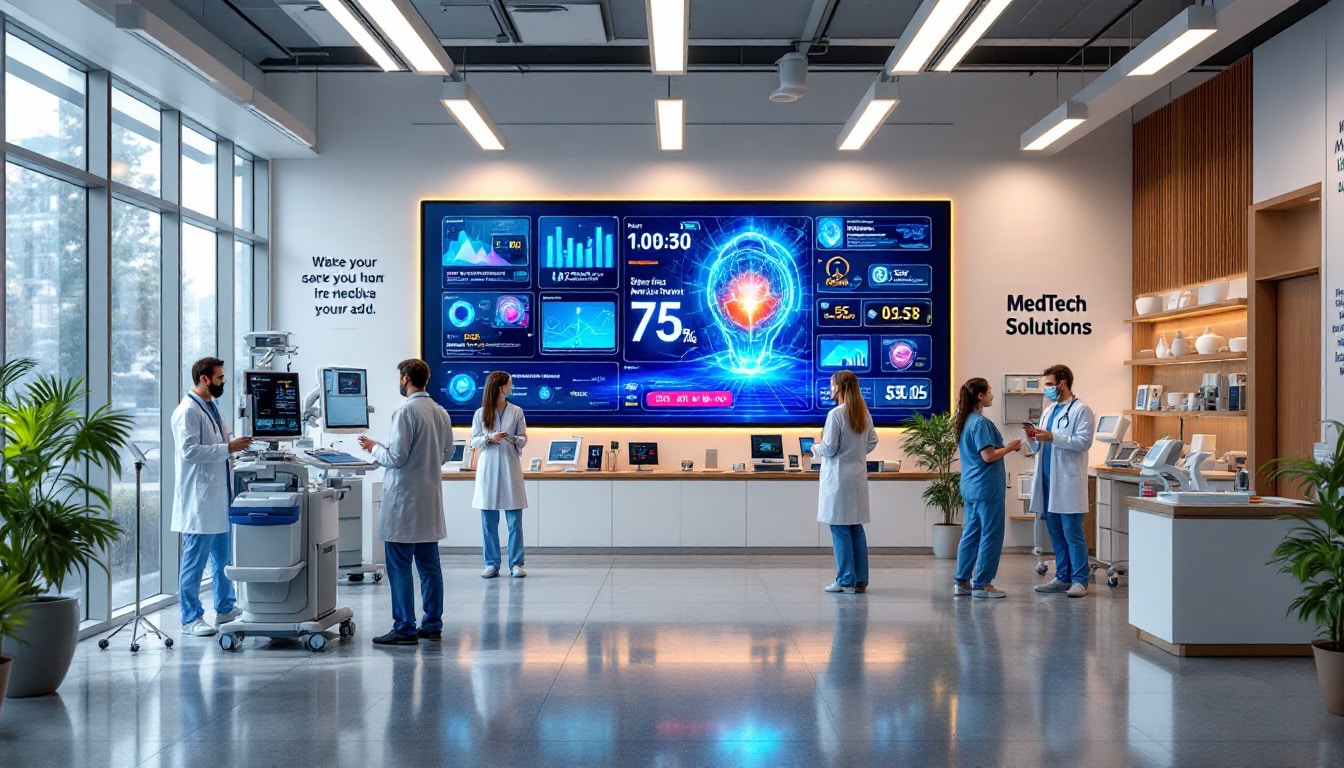Medical advances are revolutionizing our understanding of health. Every discovery opens new perspectives for patient well-being. Research in medical innovations is at the heart of these transformations.
Constantly exploring the boundaries of science, researchers are developing unprecedented solutions. The integration of cutting-edge technologies enables more effective and personalized treatments. Thanks to these innovations, many diseases are finding new treatments. The future of medicine looks promising, improving life for millions of people.

Introduction to human leadership in health in the era of AI
In the era of artificial intelligence (AI), the healthcare sector is undergoing an unprecedented transformation. Technological advances offer unprecedented opportunities to improve patient care, optimize medical processes, and develop innovative solutions. However, this rapid evolution also poses challenges, particularly regarding maintaining human-centered leadership. It becomes essential for health leaders to find a balance between the integration of cutting-edge technologies and the preservation of empathy and human connection in medical care.
How is AI transforming healthcare management?
AI is revolutionizing healthcare management by automating administrative tasks, improving medical diagnosis, and personalizing treatments. With sophisticated algorithms, healthcare professionals can analyze vast datasets to identify trends, predict epidemics, and optimize resource allocation. For example, the interactive simulation FAST4, an innovation serving medtech, creates virtual environments to train future medical leaders, thereby enhancing their management and decision-making skills.
Essential qualities of a human-centered leader
A human-centered leader in the healthcare field must possess a unique combination of technical and interpersonal skills. Empathy, effective communication, and the ability to inspire and motivate are indispensable qualities. These leaders must also be open to change, capable of adapting organizational strategies in response to technological advances and patient needs. The ability to integrate AI while maintaining a personalized approach to care is crucial for ensuring a smooth transition to a more innovative and inclusive health model.
Integrating AI while preserving empathy
The integration of AI into healthcare must not come at the expense of empathy and human connection. Leaders must ensure that technologies are used to complement and enhance the work of healthcare professionals, rather than replace it. For instance, during the testimony of Scott Whitaker, CEO of Dadvamed, he highlighted the importance of supporting initiatives aimed at reducing the costs of medical technologies, thus enabling broader and more inclusive adoption of innovations while keeping the patient at the center of concerns.
Examples of medical innovations guided by human leadership
Human-centered leadership has led to significant advancements in the medical field. For example, Johnson & Johnson MedTech recently showcased its latest orthopedic innovations at the LOAOS congress. These innovations are the result of close collaboration between researchers, engineers, and medical practitioners, aimed at enhancing patients’ quality of life. Similarly, the presentation by H.R. Young from the Leon Hess Business School on creating global leaders in the medical technology sector highlighted the importance of training leaders capable of combining technical expertise with human sensitivity.
Challenges and opportunities for health leaders
The adoption of AI in the healthcare sector presents both challenges and opportunities for leaders. Among the challenges are managing sensitive data, protecting patient privacy, and the need to train healthcare professionals on new technologies. However, the opportunities are equally numerous. AI allows for better personalization of care, early detection of diseases, and optimization of hospital resources. A weekly summary of the latest advancements shows that institutions that invest in human and technological leadership strategies perform better and provide higher quality care.
Toward a future where humans and AI coexist in health
The future of health lies in the harmonious collaboration between AI and human-centered care. Leaders must therefore focus on developing integrative strategies that leverage the strengths of both fields. This involves implementing ongoing training for healthcare professionals, adopting ethical technologies, and creating a work environment that fosters innovation and compassion. By emphasizing human-centered leadership, the healthcare sector can not only overcome technological challenges but also create a more resilient and empathetic care system.
In the era of Artificial Intelligence, health leadership centered on humanity is taking on crucial importance. Leaders must navigate a constantly evolving technological landscape while keeping patient well-being at the heart of their decisions. The integration of AI offers unprecedented opportunities to improve diagnostics, personalize treatments, and optimize operational processes, but it also requires thoughtful management to avoid the dehumanization of care.
An effective leadership must promote close collaboration between healthcare professionals and technology experts. This involves fostering a culture of responsible innovation, where technological advances are used to enhance, rather than replace, human interaction. Leaders must ensure that AI-based solutions respect ethics, patient confidentiality, and rights while being transparent and accessible.
Furthermore, the development of human skills remains essential. Leaders must invest in continuous training for medical teams, enabling them to master technological tools while cultivating their empathy and ability to communicate effectively. This duality between technical expertise and human qualities is key to providing holistic and personalized care.
Moreover, a human-centered leadership must include active listening to patient needs and constant adaptation of healthcare services accordingly. AI can provide valuable data analytics, but it is the understanding of individual contexts and human experiences that forges a lasting trust relationship between patients and caregivers.
In summary, in the era of AI, health leadership must harmonize technological advances with a deeply human approach. By emphasizing collaboration, ethics, and skill development, leaders can guide the healthcare sector toward a future where technology and humanity coexist to provide superior quality care.














